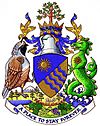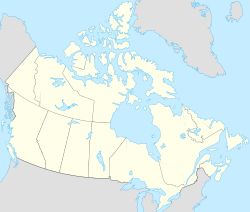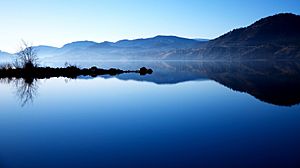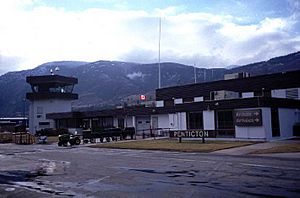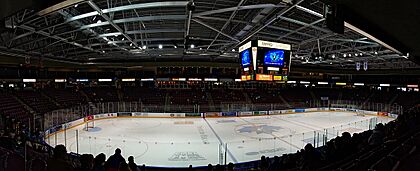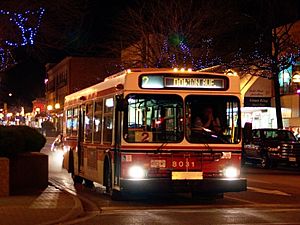Penticton facts for kids
Quick facts for kids
Penticton
|
|||||
|---|---|---|---|---|---|
| The Corporation of the City of Penticton | |||||
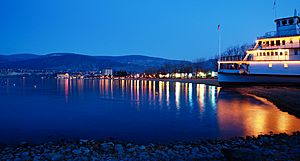
Penticton waterfront and the SS Sicamous at night
|
|||||
|
|||||
| Nickname(s):
The Peach City
|
|||||
| Motto(s):
A Place to Stay Forever
|
|||||
| Country | Canada | ||||
| Province | British Columbia | ||||
| Region | Okanagan | ||||
| Regional district | Okanagan-Similkameen | ||||
| Incorporated • District |
December 31, 1908 |
||||
| • City | May 10, 1948 | ||||
| Area
(2016)
|
|||||
| • City | 42.10 km2 (16.25 sq mi) | ||||
| • Metro | 1,724.95 km2 (666.01 sq mi) | ||||
| Elevation | 344 m (1,129 ft) | ||||
| Population
(2016)
|
|||||
| • City | 33,761 | ||||
| • Density | 801.8/km2 (2,077/sq mi) | ||||
| • Metro | 43,432 (68th) | ||||
| • Metro density | 25.2/km2 (65/sq mi) | ||||
| Demonym(s) | Pentictonite | ||||
| Time zone | UTC−08:00 (PST) | ||||
| • Summer (DST) | UTC−07:00 (DST) | ||||
| Forward sortation area |
V2A
|
||||
| Area code(s) | 250, 778, 236, 672 | ||||
| Highways | Highway 97 | ||||
| Waterways | Okanagan Lake, Okanagan River, Skaha Lake | ||||
Penticton is a city in the Okanagan Valley of British Columbia, Canada. It sits between two large lakes: Okanagan Lake and Skaha Lake. In 2016, about 33,761 people lived in Penticton. If you include the surrounding areas, the population was 43,432.
Contents
- Understanding the Name Penticton
- Penticton's Past: A Brief History
- Penticton's Location and Landscape
- People of Penticton: Demographics
- Penticton's Buildings: Architecture
- Fun Places: Public Spaces
- Learning in Penticton: Education
- Sports and Recreation in Penticton
- City Services: Infrastructure
- Famous People from Penticton
- Media in Penticton
- Penticton's Sister City: International Relations
- See also
Understanding the Name Penticton
The name Penticton comes from the Okanagan language. Many people translate it as "a place to stay forever." However, it actually describes how the water from Okanagan Lake flows into Skaha Lake all year long.
Some older meanings of the name include:
- "Place where water passes beyond."
- "A place of permanent home where waters pass by."
- "Ever" or "forever," referring to the constant flow of the Okanagan River from the lake. This was different from other streams that dried up in summer.
Penticton's Past: A Brief History
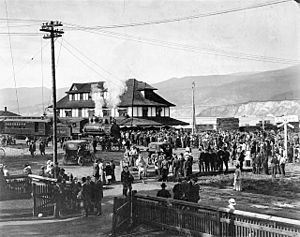
The area where Penticton is today was first settled by the Syilx (Okanagan people). They are part of the Interior Salish languages group. They called the place Phthauntac, meaning "ideal meeting place." Later, they used the name Penticton, which means "a place where people live year-round." These people lived around the two lakes, Skaha Lake and Okanagan Lake. Their descendants are now part of the Penticton Indian Band, a First Nations government near the city.
In 1866, an Irish family led by Thomas Ellis became the first white settlers. He started a cattle business and planted fruit trees. The first Penticton Hotel was built by Ellis in 1892. It was located near the local government area and the first road, Front Street.
The SS Aberdeen was a large boat that started service on Okanagan Lake in 1892. This made it easier to bring goods to the area. By 1907, local residents formed a group called the Board of Trade. They wanted to improve arts, business, education, and fun activities in the area. Another large boat, the SS Okanagan, also started service on Okanagan Lake that year.
Penticton officially became a district municipality on December 31, 1908. Soon after, the fruit trees planted by Ellis, especially apple trees, began to produce a lot of fruit. People in the area packed the fruit into boxes to sell all over the world. In 1912, the Canadian Pacific Railway (CPR) built the Incola Hotel, which was open for about 70 years.
During World War I, the SS Sicamous boat came to the community. The Kettle Valley Railway also started train service, carrying passengers. In 1949, Penticton bought the ship from the Canadian Pacific Railway. The Penticton Regional Airport was built during World War II. It was first an emergency landing strip for military planes.
In 1948, a new highway opened between Hope and Princeton. This made it easier to reach Penticton and created competition for the Kettle Valley Railway. The railway's main office in Penticton, chosen in 1910, burned down in 1964. Much of the old railway path is now a walking and biking trail called the Kettle Valley Rail Trail. This trail is part of the Trans Canada Trail. Penticton officially became a city on May 10, 1948.
In 2021, a church in Penticton called Sacred Heart Mission Church was burned. This happened during a time when other churches were also affected. These events were linked to the discovery of unmarked graves at former Canadian Indian residential school sites.
Penticton's Location and Landscape
Penticton is located at about 49°29′28″N 119°35′19″W. It covers an area of 42.10 square kilometers. The city stretches about 7 kilometers between Okanagan Lake in the north and Skaha Lake in the south. These lakes are part of the Okanogan River system, which flows into the Columbia River. Penticton is about 385 meters above sea level. It is about five hours by highway from Seattle, Washington, and Vancouver, British Columbia. It is also about eight hours from Calgary, Alberta.
Land Features of Penticton
Penticton is the largest city in the Regional District of Okanagan-Similkameen. It is the third largest city in the wider Okanagan region. Penticton is the 21st largest city in British Columbia by population. Its metropolitan area is the 71st largest in Canada.
The city sits at the south end of Okanagan Lake and the north end of Skaha Lake. Between these two lakes, you can find homes and farms. These farms grow fruits and make wine.
The mountains and high areas around Penticton have many pine and fir trees. These include the Okanagan Highland and the Monashee Mountains to the east. Apex Mountain Resort, a ski area, is located 33 kilometers west of the city. It has the tallest mountain peak in the Penticton area.
Penticton's Weather
Penticton has a semi-arid climate, which means it's quite dry. It has hot summers with cool nights. Winters are moderately cool and often cloudy. With only 346.0 millimeters of rain each year, Penticton is the fourth driest city in Canada. It gets about 58.7 centimeters of snow each year. Penticton has the mildest winter of any Canadian city not on the coast.
During summer, Penticton has many days over 30°C. It also has the least amount of fog in Canada. Penticton gets 1,923 hours of sunshine each year. This is less than you might expect for a dry climate. This is because of temperature inversions in winter. These inversions create a layer of cloud cover in the valley. In December and January, Penticton is one of the cloudiest places in Canada. But summer months are some of the clearest.
The weather in Penticton is watched at the Penticton Regional Airport. The city experiences four clear seasons every year. It has hot summers, mild winters, and not much snow. Even with mild winters, Penticton often has cold periods below freezing in December and January.
The hottest temperature ever recorded in Penticton was 44.2°C on June 30, 2021. The coldest was -27.6°C on January 13, 2024.
| Climate data for Penticton (Penticton Regional Airport) WMO ID: 71889; coordinates 49°27′47″N 119°36′08″W / 49.46306°N 119.60222°W; elevation: 344.4 m (1,130 ft); 1991−2020 normals, extremes 1907−present |
|||||||||||||
|---|---|---|---|---|---|---|---|---|---|---|---|---|---|
| Month | Jan | Feb | Mar | Apr | May | Jun | Jul | Aug | Sep | Oct | Nov | Dec | Year |
| Record high humidex | 14.1 | 15.9 | 21.1 | 29.4 | 34.7 | 46.0 | 42.1 | 41.1 | 36.2 | 27.1 | 18.9 | 22.5 | 46.0 |
| Record high °C (°F) | 15.7 (60.3) |
17.8 (64.0) |
21.7 (71.1) |
30.6 (87.1) |
34.4 (93.9) |
44.2 (111.6) |
40.6 (105.1) |
38.9 (102.0) |
36.6 (97.9) |
28.9 (84.0) |
19.4 (66.9) |
22.5 (72.5) |
44.2 (111.6) |
| Mean daily maximum °C (°F) | 1.6 (34.9) |
4.7 (40.5) |
10.2 (50.4) |
15.7 (60.3) |
21.4 (70.5) |
24.6 (76.3) |
29.2 (84.6) |
28.4 (83.1) |
22.6 (72.7) |
14.3 (57.7) |
6.7 (44.1) |
2.1 (35.8) |
15.1 (59.2) |
| Daily mean °C (°F) | −0.8 (30.6) |
0.8 (33.4) |
4.9 (40.8) |
9.1 (48.4) |
14.3 (57.7) |
17.6 (63.7) |
21.4 (70.5) |
20.6 (69.1) |
15.6 (60.1) |
8.9 (48.0) |
3.4 (38.1) |
−0.4 (31.3) |
9.6 (49.3) |
| Mean daily minimum °C (°F) | −3.2 (26.2) |
−3.2 (26.2) |
−0.6 (30.9) |
2.4 (36.3) |
7.1 (44.8) |
10.6 (51.1) |
13.5 (56.3) |
12.8 (55.0) |
8.5 (47.3) |
3.5 (38.3) |
0.0 (32.0) |
−2.8 (27.0) |
4.1 (39.4) |
| Record low °C (°F) | −27.6 (−17.7) |
−26.7 (−16.1) |
−17.8 (0.0) |
−8.1 (17.4) |
−5.6 (21.9) |
0.0 (32.0) |
2.2 (36.0) |
0.6 (33.1) |
−5.6 (21.9) |
−14.5 (5.9) |
−22.3 (−8.1) |
−27.2 (−17.0) |
−27.6 (−17.7) |
| Record low wind chill | −32.6 | −34.0 | −27.8 | −11.0 | −10.1 | 0.0 | 0.0 | 0.0 | −6.0 | −21.2 | −34.0 | −39.7 | −39.7 |
| Average precipitation mm (inches) | 28.1 (1.11) |
19.3 (0.76) |
22.7 (0.89) |
25.6 (1.01) |
38.2 (1.50) |
43.8 (1.72) |
28.3 (1.11) |
27.0 (1.06) |
24.5 (0.96) |
28.9 (1.14) |
28.1 (1.11) |
29.6 (1.17) |
344.1 (13.55) |
| Average rainfall mm (inches) | 12.9 (0.51) |
12.6 (0.50) |
18.0 (0.71) |
25.1 (0.99) |
38.2 (1.50) |
43.8 (1.72) |
28.3 (1.11) |
27.0 (1.06) |
24.5 (0.96) |
28.9 (1.14) |
21.9 (0.86) |
12.2 (0.48) |
293.3 (11.55) |
| Average snowfall cm (inches) | 19.1 (7.5) |
8.6 (3.4) |
5.2 (2.0) |
0.6 (0.2) |
0.0 (0.0) |
0.0 (0.0) |
0.0 (0.0) |
0.0 (0.0) |
0.0 (0.0) |
0.2 (0.1) |
7.5 (3.0) |
20.4 (8.0) |
61.6 (24.3) |
| Average precipitation days (≥ 0.2 mm) | 13.0 | 10.1 | 9.4 | 8.9 | 10.9 | 10.9 | 7.4 | 6.4 | 7.4 | 9.7 | 12.2 | 14.0 | 120.2 |
| Average rainy days (≥ 0.2 mm) | 6.9 | 6.8 | 8.1 | 8.7 | 10.9 | 10.9 | 7.4 | 6.4 | 7.4 | 9.7 | 9.8 | 6.4 | 99.3 |
| Average snowy days (≥ 0.2 cm) | 8.1 | 4.4 | 2.1 | 0.35 | 0.0 | 0.0 | 0.0 | 0.0 | 0.0 | 0.09 | 3.1 | 9.7 | 27.9 |
| Average relative humidity (%) (at 1500 LST) | 72.3 | 61.5 | 48.3 | 39.0 | 38.7 | 38.8 | 33.3 | 34.0 | 41.0 | 52.6 | 65.8 | 72.0 | 49.8 |
| Mean monthly sunshine hours | 35.0 | 81.4 | 144.3 | 189.7 | 234.3 | 237.3 | 287.9 | 279.7 | 212.3 | 135.0 | 53.0 | 33.7 | 1,923.3 |
| Percent possible sunshine | 13.0 | 28.6 | 39.2 | 46.1 | 49.3 | 48.8 | 58.7 | 62.6 | 56.0 | 40.3 | 19.3 | 13.2 | 39.6 |
| Source: Environment and Climate Change Canada (sun 1981–2010) (June maximum) (December maximum) (January minimum) | |||||||||||||
People of Penticton: Demographics
| Historical population | ||
|---|---|---|
| Year | Pop. | ±% |
| 1921 | 3,979 | — |
| 1931 | 4,640 | +16.6% |
| 1941 | 5,777 | +24.5% |
| 1951 | 10,548 | +82.6% |
| 1956 | 11,894 | +12.8% |
| 1961 | 13,859 | +16.5% |
| 1966 | 15,330 | +10.6% |
| 1971 | 18,146 | +18.4% |
| 1976 | 21,344 | +17.6% |
| 1981 | 23,181 | +8.6% |
| 1986 | 23,588 | +1.8% |
| 1991 | 27,258 | +15.6% |
| 1996 | 30,987 | +13.7% |
| 2001 | 30,985 | −0.0% |
| 2006 | 31,909 | +3.0% |
| 2011 | 32,877 | +3.0% |
| 2016 | 33,761 | +2.7% |
| 2021 | 36,885 | +9.3% |
| Sources: Statistics Canada | ||
In 2021, the population of Penticton was 36,885. This was a growth from 33,761 people in 2016. The city has a land area of 43.03 square kilometers. The average age in Penticton is 52.4 years, which is older than the national average of 41.2. About 29.0 percent of residents are 65 years or older.
Ethnic Backgrounds
As of 2021, most residents (84.3 percent) are white. About 8.9 percent are from visible minorities, and 6.8 percent are Indigenous. The largest visible minority groups are South Asian (3.2 percent), Filipino (1.4 percent), and Chinese (1.0 percent).
| Panethnic group |
2021 | 2016 | 2011 | 2006 | 2001 | |||||
|---|---|---|---|---|---|---|---|---|---|---|
| Pop. | % | Pop. | % | Pop. | % | Pop. | % | Pop. | % | |
| European | 30,110 | 84.28% | 28,000 | 86.18% | 28,050 | 88.43% | 28,510 | 90.83% | 27,990 | 91.05% |
| Indigenous | 2,420 | 6.77% | 2,220 | 6.83% | 2,005 | 6.32% | 990 | 3.15% | 960 | 3.12% |
| South Asian | 1,130 | 3.16% | 920 | 2.83% | 710 | 2.24% | 990 | 3.15% | 755 | 2.46% |
| East Asian | 685 | 1.92% | 490 | 1.51% | 295 | 0.93% | 420 | 1.34% | 485 | 1.58% |
| Southeast Asian | 670 | 1.88% | 500 | 1.54% | 280 | 0.88% | 280 | 0.89% | 305 | 0.99% |
| African | 265 | 0.74% | 95 | 0.29% | 120 | 0.38% | 20 | 0.06% | 65 | 0.21% |
| Latin American | 175 | 0.49% | 105 | 0.32% | 100 | 0.32% | 75 | 0.24% | 175 | 0.57% |
| Middle Eastern | 120 | 0.34% | 55 | 0.17% | 75 | 0.24% | 25 | 0.08% | 20 | 0.07% |
| Other | 150 | 0.42% | 100 | 0.31% | 75 | 0.24% | 85 | 0.27% | 0 | 0% |
| Total responses | 35,725 | 96.86% | 32,490 | 96.24% | 31,720 | 96.48% | 31,390 | 98.37% | 30,740 | 99.21% |
| Total population | 36,885 | 100% | 33,761 | 100% | 32,877 | 100% | 31,909 | 100% | 30,985 | 100% |
- Note: Totals greater than 100% due to multiple origin responses.
Languages Spoken
In 2016, 86.4 percent of people in Penticton spoke English as their first language. Other common first languages include German (2.2 percent), Punjabi (1.8 percent), and French (1.8 percent).
Religious Beliefs
According to the 2021 census, over half of Penticton residents (55.0 percent) reported having no religious affiliation. About 40.8 percent of people identified as Christian. Other religions practiced include Sikhism (2.1 percent), Hinduism (0.5 percent), and Buddhism (0.4 percent).
Penticton's Buildings: Architecture
Penticton has several notable buildings. The tallest are the Lakeshore buildings, which are 15 floors high. They were built in 2008 for residential use. The Athens Creek Tower and Alysen Place are the second tallest, both with ten stories. The Cherry Lane Towers are eight floors high and are also residential buildings.
Fun Places: Public Spaces
Penticton has many public spaces because of its warm climate. These include parks and hiking trails.
- Parks: The city has ten public parks. Some popular ones are Gyro Park, Okanagan Lake Park, and Skaha Lake Park.
- Beaches: There are seven beaches in Penticton. These include Okanagan Lake Beach and Skaha Lake Beach.
- Trails: You can find parts of the Trans Canada Trail and the Kettle Valley Railway trail here. These are great for walking and biking.
- Rock Climbing: Skaha Bluffs is a famous rock climbing area south of the city. It has over 1,200 climbing routes.
Learning in Penticton: Education
Penticton is part of School District 67 Okanagan Skaha. This district also includes schools in nearby communities like Naramata and Summerland. The district manages schools from kindergarten to grade 12.
- Schools: There are 10 elementary schools, 3 middle schools, and 3 high schools. Some high schools are Penticton Secondary School and Princess Margaret Secondary School.
- Independent Schools: Penticton also has three private schools: Penticton Christian School, Holy Cross School, and Concordia Lutheran School.
- French Schools: The Conseil scolaire francophone de la Colombie-Britannique runs two French-language schools: école Entre-lacs and école secondaire de Penticton.
- Colleges: The city is home to a Sprott Shaw College campus and an Okanagan College campus.
- Hockey School: The Okanagan Hockey School is also in Penticton. It has worked with professional hockey teams like the Vancouver Canucks.
- Library: The Penticton Public Library was started in 1909.
Sports and Recreation in Penticton
Penticton is home to several sports teams and hosts many events.
- Ice Hockey: The city has the Penticton Vees, a successful junior "A" hockey team in the British Columbia Hockey League. They play at the South Okanagan Events Centre.
- Soccer: The Penticton Pinnacles are a soccer team that plays at Kings Park.
- Other Sports: There are also local roller derby and rugby teams.
Penticton has hosted many sports events, including:
- The 2010 British Columbia Scotties Tournament of Hearts (curling).
- The 2017 International Triathlon Union Multisport World Championships.
- The 2018 Scotties Tournament of Hearts (curling).
Things to Do for Fun
Penticton offers many ways to have fun outdoors.
- Skiing: You can go skiing at the Apex Mountain Resort.
- Water Activities: Enjoy boating and fishing on Skaha Lake and Okanagan Lake. In summer, many people float down the river channel that connects the two lakes.
- Golfing: There are many golf courses in the area.
- Hiking and Biking: Explore the Kettle Valley Railway Trail and Skaha Bluffs.
- Community Centre: The Penticton Community Centre has health, fitness, and recreation options.
- South Okanagan Events Centre (SOEC): This large arena and convention center is home to the Penticton Vees hockey team. It also hosts concerts and special events. Famous performers like Rihanna and Ringo Starr & His All-Starr Band have played here.
- Outdoor Markets: From May to October, downtown Main Street hosts large outdoor markets. These include the Downtown Community Market and the Penticton Farmers Market.
- Art Gallery: The Penticton Art Gallery shows art from local and international artists. They also offer workshops.
- Wine and Craft Beverages: Penticton is a center for wine tourism in the Okanagan Valley. There are over 40 wineries within the city. You can also find craft beer, spirits, and cider.
City Services: Infrastructure
Electricity
The City of Penticton owns and operates its own Electric Utility. This provides power to homes, businesses, and industries in the community.
Getting Around: Transportation
- Public Transit: The South Okanagan-Similkameen Transit System provides local bus service on six routes. There is also a special service called HandyDART for those who cannot use regular transit.
- Highways: Penticton has access to major highways, including Highway 97.
- Airport: The Penticton Regional Airport is located southwest of the city center. It offers flights to Vancouver International Airport and Calgary.
- Water Aerodrome: The Penticton Water Aerodrome is a water airport next to the main airport. It is home to a helicopter flight training school.
Famous People from Penticton
- Jeannette Armstrong, Syilx Elder, Author, and Professor at UBCO
- Andy Bell, pro freestyle motocross champion, host of MTV's Nitro Circus
- George Bowering, poet, first ever Canadian Parliamentary Poet Laureate
- Tyler Breeze, professional wrestler
- Layla Claire, soprano
- Thomas Ellis, the first European settler in the area in 1866
- Gordon Herbert, basketball player and coach
- Brett Hull, National Hockey League (NHL) hockey player, graduate of Penticton High School
- Paul Kariya, retired NHL player, graduate of Penticton Secondary School
- Duncan Keith, NHL hockey player, graduate of Penticton Secondary School
- Alan Kerr, hockey player
- Jett Klyne, actor
- Shane Koyczan, spoken word poet
- Spencer Krug, musician from the band Wolf Parade
- Richard H. Leir, chief of maritime operations for the Canadian navy.
- Ivan McLelland, Penticton Vees player and 1955 IIHF World Hockey Champion
- Andy Moog, hockey player
- Brendan Morrison, NHL hockey player, graduate of Penticton High School
- Terry David Mulligan, actor and television personality
- Andi Naude, 2018 Olympian on the Canadian National Ski Team
- Bob Nicholson, CEO of the Edmonton Oilers
- Nakai Penny, professional rugby player for the Seattle Seawolves of Major League Rugby
- Cameron Phillips, radio broadcaster
- Justin Pogge, hockey player
- Mike Reno, musician from the band Loverboy
- Mark Allan Robinson, political activist
- Mark Rycroft, retired NHL player, Colorado Avalanche TV colour analyst
- Alexis Smith, actress
- Blake Wesley, hockey player
Media in Penticton
Radio Stations
- AM 800 – CKOR, soft adult contemporary music
- FM 92.9 - CFUZ-FM, Community radio station Peach City Radio
- FM 93.7 – CBTP-FM, CBC Radio One
- FM 97.1 – CJMG-FM, hot contemporary (Sun FM)
- FM 100.7 – CIGV-FM, country music
Penticton's Sister City: International Relations
Since 1977, Penticton has been a sister city with Ikeda, a town in Hokkaido, Japan. This relationship is one of the oldest in Canada. Many residents from both cities visit each other every year. In 1997, the Penticton–Ikeda Japanese Garden was built in Penticton to celebrate this special friendship.
See also
 In Spanish: Penticton para niños
In Spanish: Penticton para niños
 | William L. Dawson |
 | W. E. B. Du Bois |
 | Harry Belafonte |



